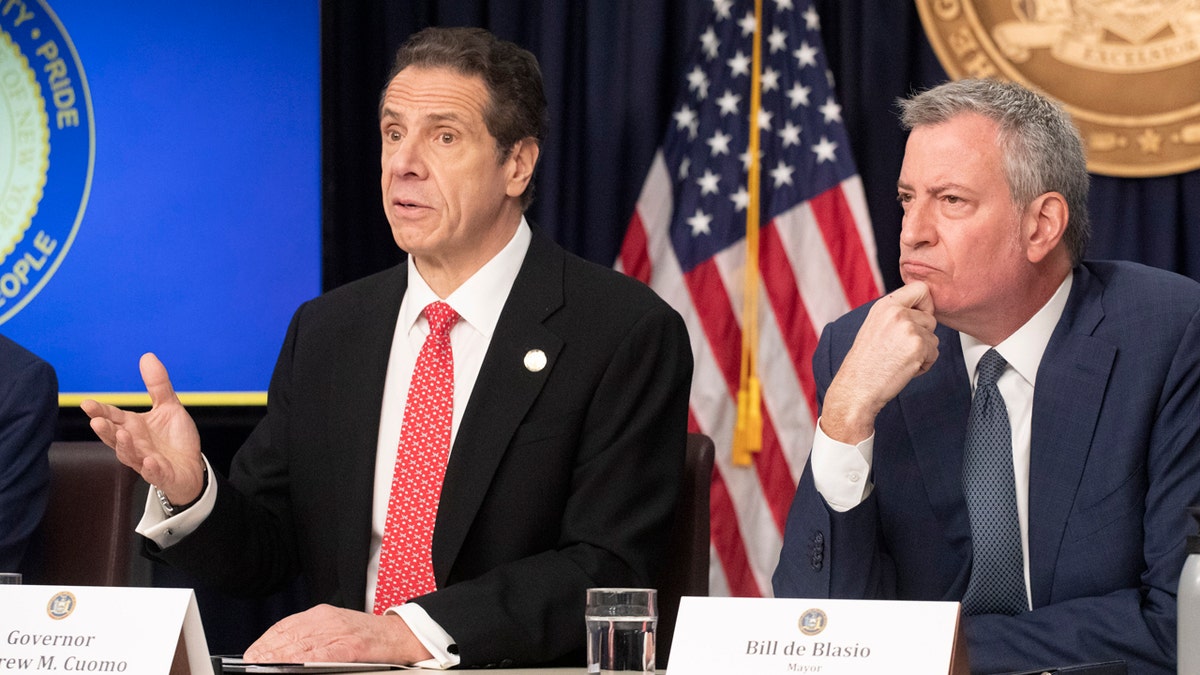Park in New Rochelle is the rumored location of a mobile testing unit for coronavirus
Raw video: Police cars are seen outside of Glen Island Park in New Rochelle, the rumored location of a mobile testing unit for coronavirus.
New York Gov. Andrew Cuomo on Thursday banned gatherings of more than 500 people throughout the state over the coronavirus, effectively turning off the lights on Manhattan’s famed Broadway just hours after Mayor Bill de Blasio said he hoped to keep the theaters open.
Cuomo said the sweeping proposal to slow down the spread of the COVID-19 virus will go into effect Friday at 5 p.m., but that the rules for Broadway will begin 5 p.m. Thursday.
That evening, de Blasio declared a state of emergency in the city, stating that the outbreak "could easily be a six-month crisis."
CLICK HERE FOR FULL CORONAVIRUS COVERAGE
“We are taking new actions to reduce the density of people across the state,” Cuomo announced on Twitter. “We must plan for every contingency & we are taking measures to create a reserve workforce of health care professionals in the event of a staffing shortage.”
The governor also said facilities with an occupancy of 500 or fewer will have their legal capacity reduced by 50 percent.
The Manhattan theaters were told about the new measures in advance and they agreed with government officials, Cuomo said. The Broadway League issued a statement, which said all Broadway shows were suspended through April 12.
The city saw coronavirus cases increase from 49 to at least 62 on Thursday, while the entire state saw a jump from 226 cases to at least 328.
DE BLASIO WANTS NEW YORK CITY'S SCHOOLS, SUBWAY, BROADWAY TO REMAIN OPEN DESPTIE CORONAVIRUS
Cuomo’s announcement comes just hours after de Blasio said he wanted “to keep as much normalcy in society as possible” by having public events such as Broadway shows to remain open.

New York Gov. Andrew Cuomo, left, and Mayor Bill de Blasio discussed the state and city's preparedness for the spread of the coronavirus in New York on March 2. (AP Photo/Mark Lennihan, File)
“I don’t want to see Broadway go dark if we can avoid it,” de Blasio told CNN in a Thursday morning interview. “I want to see if we can strike some kind of balance.”
The mayor also said that he hopes to avoid drastic measures such as shutting the city’s entire public school system or its subways.
NEW ROCHELLE TURNS INTO GHOST TOWN AMID CORONAVIRUS OUTBREAK BEFORE NATIONAL GUARD'S ARRIVAL
However, de Blasio later announced the closure of two public schools that share a building in the Bronx that will close for 24 hours because a student tested positive for COVID-19.
Speaking at a news conference later, de Blasio said he had received "a lot of information in the course of a day yesterday and a lot change then, then last night it just seemed the world turned upside down in the course of a few hours."
New York’s Superintendent of Catholic Schools Michael J. Deegan announced that all Catholic elementary schools in the Archdiocese of New York would close from March 16 to March 20, with the possibility of an extension.
All Catholic high school athletic events and practices have been canceled indefinitely, the archdiocese said in a statement.
Other major U.S. cities have already enacted bans on large gatherings, with leaders in Seattle and San Francisco both announcing restrictions Wednesday to slow the spread of the infectious disease.
SEATTLE HOMELESS SHELTER RESIDENT MOVES TO CORONAVIRUS QUARANTINE MOTEL, STATE BANS LARGE GATHERINGS
While widespread school closures have not been ordered in San Francisco, Seattle Public Schools Superintendent Denise Juneau said all schools would close for at least two weeks for its 53,000 students, calling it “an unprecedented situation.”
Several theater venues in the San Francisco Bay Area have canceled or postponed shows, while the Curran Theater reduced capacity to exactly 1,000 people, KGO-TV reported.
The new coronavirus causes only mild or moderate symptoms such as fever and cough for most people, but for some, especially older adults and people with existing health problems, it can cause more severe illness, including pneumonia.
CLICK HERE FOR THE FOX NEWS APP
There have been 36 virus-related deaths in the U.S. and at least 1,300 confirmed cases.

